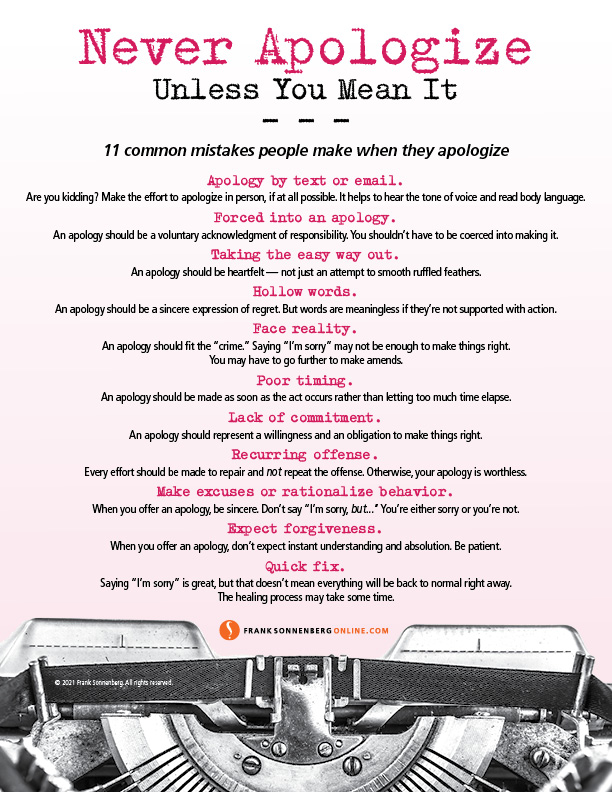
A Sorry Apology Can Add Insult to Injury
We’ve all been raised to say “I’m sorry” after hurting someone through our words or actions, but is your apology disingenuous or a meaningful expression of regret? When you try to repair the damage, do you make the situation better or worse? An apology shouldn’t be a knee-jerk reaction acknowledging that you hurt someone. When you say “I’m sorry,” you imply that you notice, you care, and most of all, you promise it won’t happen again. As such, an apology is more than just a statement of contrition; you’re putting your honor on the line. If you repeat the act again, you’re indicating that you were more interested in creating peace than in changing your ways.
Never Apologize Unless You Mean It
Never say, “I’m sorry” unless you mean it. A sorry apology can add insult to injury. While people may be angry or disappointed by the offense, it pales in comparison to an insincere apology. Here are 11 common mistakes people make when they apologize:
Apology by text or email. Are you kidding? Make the effort to apologize in person, if at all possible. It helps to hear the tone of voice and read body language.
Forced into an apology. An apology should be a voluntary acknowledgment of responsibility. You shouldn’t have to be coerced into making it.
Taking the easy way out. An apology should be heartfelt — not just an attempt to smooth ruffled feathers.
Hollow words. When you apologize, it should be a sincere expression of regret. But words are meaningless if they’re not supported with action.
Face reality. An apology should fit the “crime.” Saying “I’m sorry” may not be enough to make things right. You may have to go further to make amends.
Poor timing. Apologize as soon as the act occurs rather than letting too much time elapse.
Lack of commitment. An apology should represent a willingness and an obligation to make things right.
Recurring offense. Every effort should be made to repair and not repeat the offense. Otherwise, your apology is worthless.
Make excuses or rationalize behavior. When you apologize, be sincere. Don’t say “I’m sorry, but…” You’re either sorry or you’re not.
Expect forgiveness. When you apologize, don’t expect instant understanding and absolution. Be patient.
Quick fix. Saying “I’m sorry” is great, but that doesn’t mean everything will be back to normal right away. The healing process may take some time.
Do You Know How to Make An Apology?
Please leave a comment and tell us what you think or share it with someone who can benefit from the information.
Additional Reading:
Forgiveness: It’s Good For You
A Promise Is a Promise
How to Make Your Words Meaningful
Have You Ever Been Betrayed?
25 Things You Should Never Apologize For
Broken Promises, Broken Commitments
23 Ways to Spot a Hypocrite
If you like this article, subscribe to our blog so that you don’t miss a single post. Get future posts by RSS feed, email or Facebook. It’s FREE.





Leave a Comment